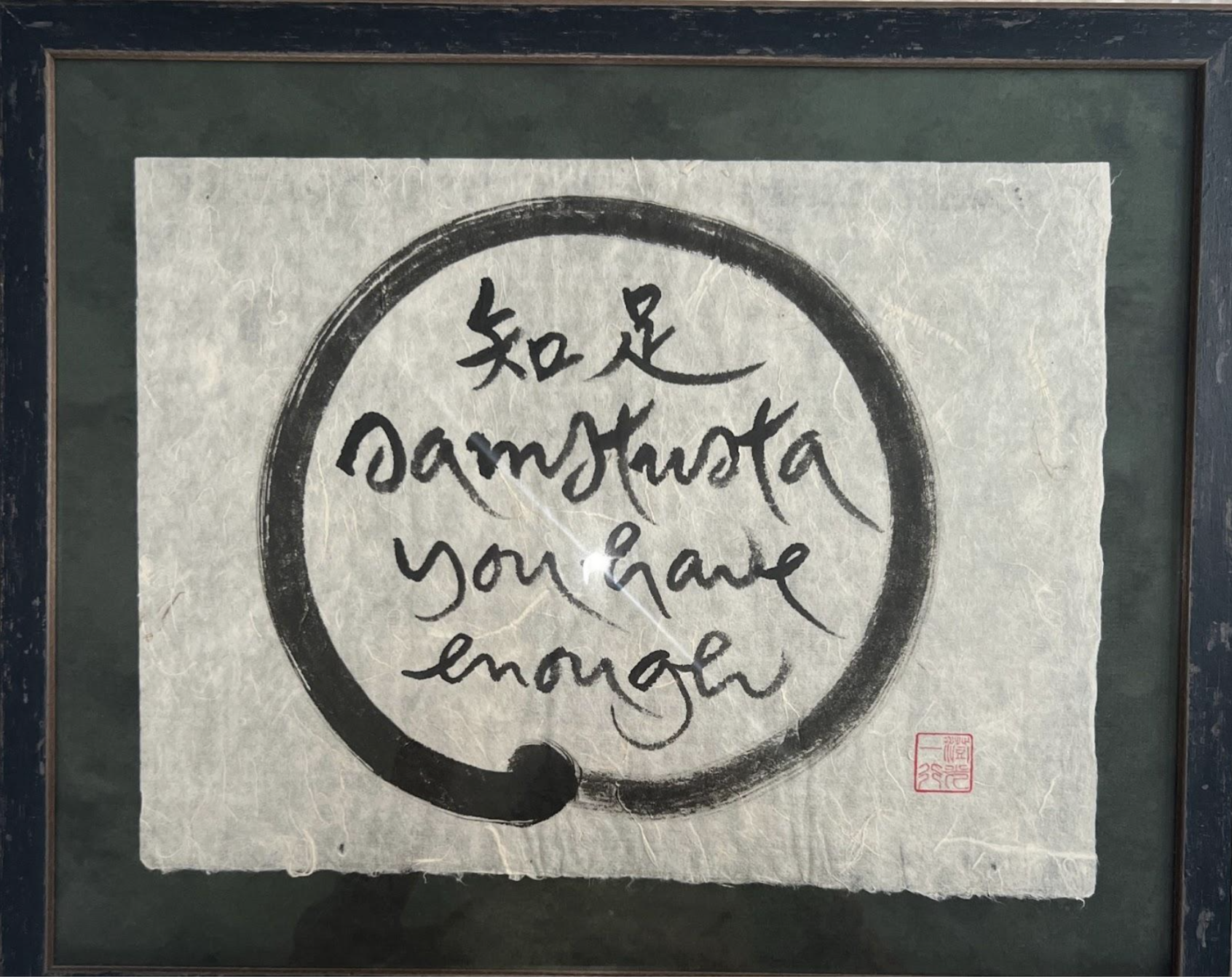Monday, December 30, we will meet in person.
Go to calendar for our schedule
Address for OHMC meditation space:
3812 Northampton St. NW, Washington DC 20015
Please arrive a few minutes early so we can invite the bell on time. You may also arrive 15 minutes early to practice working meditation by helping us set up cushions.
Dear friends,
This week, we will meet Monday evening, Dec. 30, from 7-8:30PM EST in person at our meditation space (3812 Northampton Street NW); Wednesday morning, Jan. 1, from 7-8AM EST online; and Friday, Jan. 3, from 12-1PM EST in person & online (hybrid).
This Monday evening, Annie will facilitate. Annie shares:
Dear Friends,
This week we will read the Five Mindfulness Trainings and focus on the Second Training: True Happiness (full text below). Annie will facilitate.
As we head into a new year, and when gift giving and receiving, we may be reflecting on what we think we need to be happy. Some years ago, at a retreat with Thich Nhat Hanh (Thay), I purchased this piece of his calligraphy:
Samstusta
You Have Enough
Samstusta, or the related sanskrit term, Santosha, may be defined as contentment or feeling satisfied, or not needing something outside of ourselves to run after. This concept shows up in the Yoga Sutras as one of the niyamas, or practices, as well as in Buddhist writings. It’s something we humans have known was a source of our well-being for at least two centuries.
‘What you are looking for is not outside of you; it is already here. You already are what you want to become. Concentrating on aimlessness releases your longing and craving for something in the future and elsewhere. (Thich Nhat Hanh, Lion’s Roar)
I have written about and reflected on contentment for a while. (2019 blog post here.) That’s because, for me, finding contentment can be a challenge in a world full of delicious addictions, surrounded by advertisements and suggestions. And don’t we all get caught in the habit of comparing what we have to what others have? Yet, those precious moments and days when I feel completely content are the most wonderful gifts of ease and bliss.
How do we “concentrate on aimlessness” in order to release our longings and cravings for something more, something better without giving up on making our lives and the world a better place? The Second Mindfulness Training reminds us that the way to contentment is through our mental attitudes and remembering that we already have enough conditions for happiness, right now. We don’t have to give up on the transformations we want and need.
We can’t change this moment because it already is what it is, so we might as well find the joy in it. AND we can transform ourselves bit by bit in order to show up with more awareness and more freshness. In that way we can create the world we want without rejecting or ignoring the world we already have. As the Zen teacher Suzuki Roshi told his students, “You are perfect just as you are, and you could use a little improvement.”
Thomas Wilder writes in his classic (and wonderful) play, Our Town, in the voice of the young mother Emily who dies and then realizes how quickly her life passed without her noticing all the small beautiful moments:
“Let's really look at one another!...It goes so fast. We don't have time to look at one another. I didn't realize. So all that was going on and we never noticed... Wait! One more look. Good-bye , Good-bye world. Good-bye, Grover's Corners....Mama and Papa. Good-bye to clocks ticking....and Mama's sunflowers. And food and coffee. And new ironed dresses and hot baths....and sleeping and waking up. Oh, earth,you are too wonderful for anybody to realize you. Do any human beings ever realize life while they live it--every,every minute?”
The Second Mindfulness Training reminds us the view of life that can support our contentment: By realizing life as we are living it, practicing generosity, seeing that our happiness isn't separate from the happiness of others, recognizing that running after wealth, fame, power, and sensual pleasures isn’t really satisfying, and remembering that we already have more than enough conditions to be happy – these are what can lead us to a life of greater contentment.
On Monday, let’s read the trainings together and share how we might find our way to greater Samstusta/Contentment in 2025.
With love,
annie.
The Second Mindfulness Training: True Happiness
Aware of the suffering caused by exploitation, social injustice, stealing, and oppression, I am committed to practicing generosity in my thinking, speaking, and acting. I am determined not to steal and not to possess anything that should belong to others; and I will share my time, energy, and material resources with those who are in need. I will practice looking deeply to see that the happiness and suffering of others are not separate from my own happiness and suffering; that true happiness is not possible without understanding and compassion; and that running after wealth, fame, power and sensual pleasures can bring much suffering and despair. I am aware that happiness depends on my mental attitude and not on external conditions, and that I can live happily in the present moment simply by remembering that I already have more than enough conditions to be happy. I am committed to practicing Right Livelihood so that I can help reduce the suffering of living beings on Earth and stop contributing to climate change.
Santosha = contentment one of the niyamas
Thay’s calligraphy
Thirst /Tanha
Thirsty

